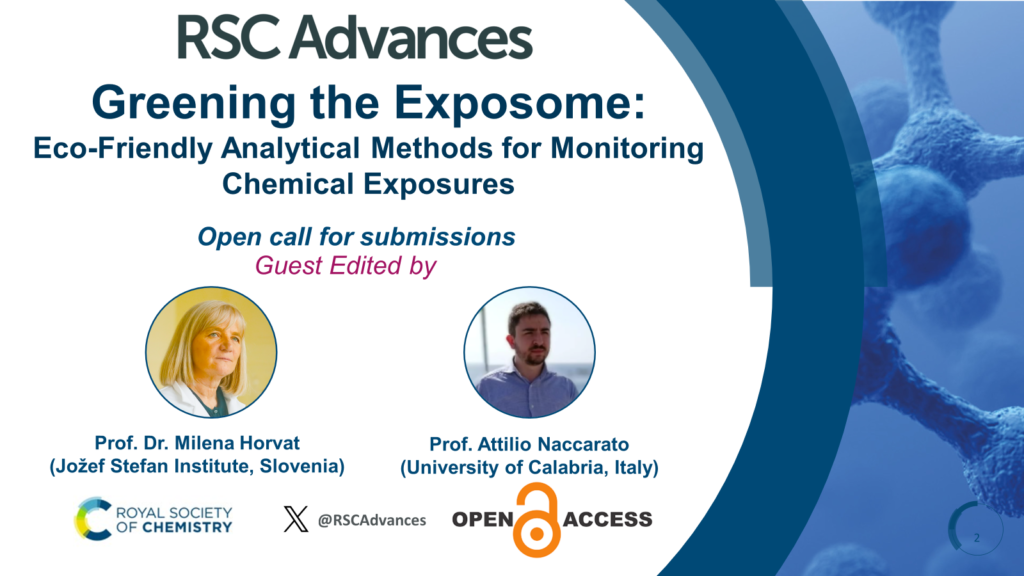RSC Advances is delighted to announce a new themed collection entitled Greening the Exposome: Eco-Friendly Analytical Methods for Monitoring Chemical Exposures.
This collection is Guest Edited by Prof. Attilio Naccarato (University of Calabria, Italy) and Prof. Dr. Milena Horvat (Jožef Stefan Institute, Slovenia).
We welcome your submission to the series!
The exposome, encompassing all environmental exposures throughout life, plays a crucial role in human health and disease. Monitoring chemical exposures from various sources, including the environment and food, is essential for understanding their impact on health outcomes. However, traditional analytical methods often rely on harsh chemicals, generate hazardous waste, and contribute to environmental burdens.
RSC Advances is pleased to announce a themed collection dedicated to innovative and eco-friendly analytical methods for monitoring chemical exposures within the exposome framework. This special issue aims to showcase recent advancements in sustainable analytical strategies for assessing human exposure to environmental and foodborne contaminants, offering valuable insights that can benefit the fields of epidemiology, clinical chemistry, and environmental medicine.
Topics of interest include, but are not limited to:
1. Advancements in eco-friendly analytical techniques: Innovative analytical methods for exposome analysis designed to minimize environmental impact, including the use of green solvents, sustainable sample preparation techniques, and miniaturized analytical platforms.
2. Microfluidics and Lab-on-a-Chip technologies: Application of Microfluidics and Lab-on-a-Chip technologies for high-throughput analysis of environmental and biological samples to rapidly detect contaminants and biomarkers.
3. High-throughput screening for exposome-wide chemical analysis: Innovative approaches for conducting exposome-wide chemical analysis, including high-throughput screening methods and advanced data processing techniques for mapping exposure profiles and potential health risks.
4. Use of novel sensors: Implementation of biosensors, in-situ sensors, on-site, and personal sensing devices for monitoring exposures.
5. Analytical challenges and solutions: Addressing key analytical challenges with exposome investigations, such as sample complexity, matrix effects, and data integration, with a focus on novel analytical solutions and methodologies.
6. Quality assurance and quality control (QA/QC) procedures: Emphasizing the critical role of robust QA/QC procedures to ensure the reliability and validity of exposome data. Topics could include calibration strategies, method validation, proficiency testing, and inter-laboratory comparisons, metrological challenges, and analytical data interpretation in line with the FAIR (Findable, Accessible, Interoperable, and Reusable) data principles.
Authors are encouraged to submit original research articles and reviews that address the theme of greening the exposome through sustainable analytical methods.
Submission deadline: 31st January 2025
Submit your article to this collection
Both Papers and Review articles will be considered for this themed collection. All submissions will be subject to an initial assessment by Associate Editors and, if suitable for the journal, they will be subject to rigorous peer review to meet the usual high standards of RSC Advances.
RSC Advances’ article processing charge (APC) is among the lowest in chemistry and waivers are also available for authors who meet the eligibility criteria outlined here. We have a number of Read & Publish deals in place with institutions, please see Chronoshub for more information on specific institutions and funders.
If you would like to submit to this themed collection the manuscript should be prepared according to our article guidelines and submitted via our online system any time before the submission deadline of 31 01 2025. During submission, authors will be asked if they are submitting for a themed collection and should include the name of the themed collection. If you would like to submit but require additional time to prepare your article, please do let us know by contacting the journal.
Submit to RSC Advances today! Check out our author guidelines for information on our article types or find out more about the advantages of publishing in a Royal Society of Chemistry journal.
Keep up to date with our latest Popular Advances, Reviews, Collections & more by following us on X. You can also keep informed by signing up to our E-Alerts.












